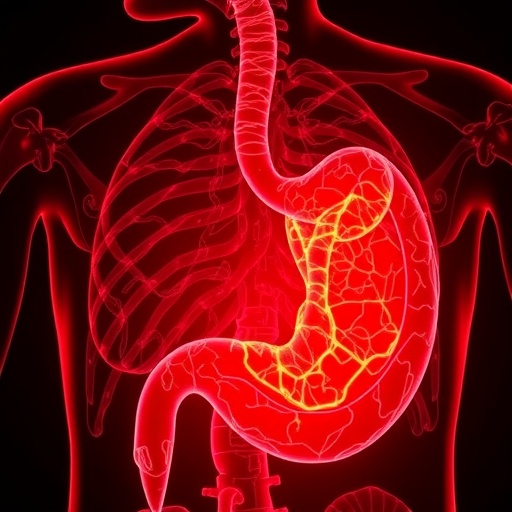In a groundbreaking study published in the journal Cell Death Discovery, researchers have unveiled a novel molecular mechanism driving gastric cancer progression with profound implications for diagnosis and targeted therapy. The investigation sheds light on the epigenetic modulation of a critical transcription factor, PHOX1, whose dysregulation acts as a pivotal catalyst in tumor advancement. By deciphering the intricate pathway through which hypomethylation elevates PHOX1 expression, leading subsequently to the activation of NGFR (nerve growth factor receptor), this research marks a significant leap forward in understanding gastric carcinogenesis and opens new avenues for therapeutic intervention.
Gastric cancer remains one of the leading causes of cancer-related mortality worldwide, primarily due to late diagnosis and limited effective treatment options for advanced disease stages. While genetic mutations have long been recognized as contributors to tumorigenesis, epigenetic alterations—heritable changes in gene expression without alterations in DNA sequence—have gained attention for their profound role in cancer biology. The current study delves deep into DNA methylation patterns, focusing particularly on the promoter region of the PHOX1 gene, revealing a hypomethylation state that drives its aberrant overexpression in gastric cancer tissues compared to normal gastric mucosa.
PHOX1, a homeobox transcription factor originally known for its roles during embryonic development, emerges from this study as a powerful oncogenic driver in gastric cancer. When hypomethylation reduces suppressive marks on the PHOX1 gene promoter, there is a marked increase in PHOX1 mRNA and protein levels. This surge in expression does not merely serve as a biomarker but initiates a cascade of downstream transcriptional events. The researchers employed chromatin immunoprecipitation assays alongside transcriptomic profiling to pinpoint NGFR—a gene encoding the nerve growth factor receptor—as a direct transcriptional target of PHOX1.
NGFR, widely studied in neural development and survival, has intriguingly been implicated in various cancers. The study elucidates how PHOX1 directly binds to the NGFR promoter region, thereby transactivating its expression. Elevated NGFR then participates in the modulation of pro-survival signaling pathways that promote tumor cell proliferation, invasion, and resistance to apoptosis. Experimental validation using gastric cancer cell lines demonstrated that knockdown of PHOX1 significantly reduces NGFR levels and suppresses malignant phenotypes, confirming their functional interdependence.
Complementing in vitro findings, in vivo experiments employing xenograft models substantiated the tumorigenic role of the PHOX1-NGFR axis. Tumors with enforced PHOX1 expression exhibited accelerated growth, augmented invasiveness, and poorer overall survival outcomes. Conversely, silencing PHOX1 or NGFR markedly impeded tumor progression, underscoring the therapeutic potential of targeting this epigenetic and transcriptional circuitry.
Technologically, the team integrated bisulfite sequencing to map methylation landscapes, demonstrating that PHOX1 promoter hypomethylation is a critical upstream event facilitating its overexpression. This method provided precise quantification of methylation marks, offering an epigenetic signature that could potentially serve as a diagnostic or prognostic biomarker. In clinical samples from gastric cancer patients, a strong inverse correlation emerged between PHOX1 methylation levels and tumor stage, corroborating the methylation-dependence of its oncogenic role.
Importantly, the study also explored potential therapeutic avenues by assessing the efficacy of DNA methyltransferase inhibitors and small molecule antagonists targeting NGFR-related pathways. Treatment with demethylating agents paradoxically heightened PHOX1 expression, highlighting the complexity of epigenetic therapies and the necessity for refined targeting strategies. Conversely, NGFR inhibition induced apoptosis and reduced migratory capacity in PHOX1-overexpressing cells, positioning NGFR as a promising druggable target downstream of epigenetic dysregulation.
Beyond the molecular insights, this discovery carries implications for personalized medicine. Stratifying gastric cancer patients based on PHOX1 methylation and expression profiles could inform prognostic assessments and tailor therapeutic regimens, potentially integrating NGFR inhibitors into treatment. Furthermore, the study advocates for the comprehensive mapping of epigenetic landscapes in other cancer types where PHOX1 and NGFR may play analogous roles, broadening the impact of these findings.
The elegant mechanistic exposition presented in this research complements existing knowledge by linking epigenetic modifications to transcriptional control that orchestrates tumor biology. It also illuminates the intricate interplay between developmental transcription factors like PHOX1 and signaling receptors such as NGFR, traditionally studied in neuronal contexts, highlighting the versatility of these molecules in oncogenesis. Such cross-disciplinary revelations enrich the cancer research landscape, fostering innovative thinking about tumor origins and progression pathways.
Future directions envisioned by the authors include exploring combinatorial therapeutic approaches that couple epigenetic modulators with receptor antagonists to dismantle the PHOX1-NGFR axis more effectively. Additionally, expanding cohort studies to validate these epigenetic markers across diverse populations and gastric cancer subtypes remains a critical step toward clinical translation.
In conclusion, this seminal study identifies hypomethylation-induced PHOX1 upregulation as a central driver of gastric cancer, operating through the transcriptional activation of NGFR. The multidimensional approach employed here—spanning molecular biology, epigenetics, and in vivo modeling—provides a robust framework for understanding and eventually targeting a novel oncogenic pathway. This research offers hope for improved therapeutic outcomes in a malignancy that continues to pose formidable challenges to clinicians and patients alike.
Subject of Research:
Gastric cancer progression via epigenetic regulation and transcriptional activation pathways.
Article Title:
Hypomethylation-mediated upregulation of PHOX1 promotes gastric cancer progression via transactivation of NGFR.
Article References:
Li, Y., Liu, W., Zheng, L. et al. Hypomethylation-mediated upregulation of PHOX1 promotes gastric cancer progression via transactivation of NGFR. Cell Death Discov. 11, 548 (2025). https://doi.org/10.1038/s41420-025-02811-3
Image Credits:
AI Generated
DOI:
28 November 2025
Tags: advancements in gastric carcinoma treatmentcancer-related mortality and diagnosisDNA methylation patterns in oncologyepigenetic modulation in cancerGastric cancer research breakthroughsmolecular mechanisms of gastric carcinogenesisNGFR activation in tumor progressionPHOX1 hypomethylation in gastric cancerrole of homeobox genes in cancertargeted therapy for gastric cancertranscription factors and cancerunderstanding epigenetic alterations in tumors





